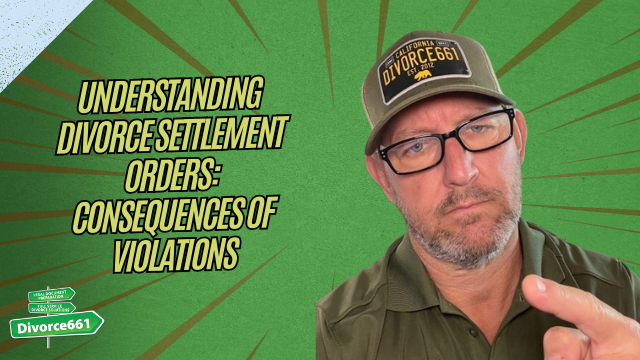Understanding Divorce Settlement Orders: Consequences of Violations
Divorce is often a complex and emotional process, and once finalized, the terms in your divorce settlement order become legally binding. If either party fails to adhere to these terms, it can lead to significant legal and financial consequences. In this post, we will explore what happens if you violate a divorce settlement order, the steps you can take if your ex does not comply, and the potential penalties for such violations.
What is a Divorce Settlement Order?
A divorce settlement order is not merely a private agreement between two parties; it is a court order that both spouses are legally obligated to follow. This order encompasses various aspects such as child custody, spousal support, property division, and any other stipulations agreed upon during the divorce proceedings. Understanding that these terms are enforceable by the court is critical.
Consequences of Violating a Divorce Settlement Order
When one party violates the terms of a divorce settlement order, the other party has the right to seek enforcement through the court. Here’s what can happen:
- Filing a Request for Order: The aggrieved party can file a request for order with the court to enforce the terms of the divorce settlement. This is often the first step to address non-compliance.
- Potential Penalties: The court can impose various penalties on the violating party. These can include financial penalties, attorney’s fees for the party that had to bring the motion, and even modifications to existing orders.
- Contempt of Court: In severe cases, the court may hold the violating party in contempt. This can result in fines or, in extreme instances, jail time.
Real-Life Example: Enforcing a Car Loan Refinance
Let’s consider a real client story to illustrate the consequences of violating a divorce settlement order. We had a client whose ex-spouse refused to refinance a car loan that had been awarded to them during the divorce. This refusal was damaging our client’s credit score. In response, we filed an enforcement motion, and the judge set a firm deadline for compliance. The seriousness of the situation was underscored by the potential consequences for ignoring the court order.
How to Take Legal Action if Your Ex Violates the Agreement
If you find yourself in a situation where your ex is not following the court order, here are steps you can take:
- Document the Violation: Keep thorough records of any instances where your ex has failed to comply with the divorce settlement order.
- Consult a Legal Professional: It’s crucial to seek legal advice from a family law attorney experienced in enforcing divorce settlements. They can guide you through the process and help prepare the necessary documentation.
- File a Motion: Your attorney can assist you in filing a motion to enforce the order. This includes preparing the request for order and any supporting documentation that proves the violation.
What Courts Can Do
Once a motion is filed, the court has several options available to address the violation:
- Enforcement: The court can order the violating party to comply with the original terms of the settlement.
- Penalties: Financial penalties may be imposed on the party that violated the order.
- Contempt Charges: If the violation is willful, the court may hold the party in contempt, which can lead to fines or jail time.
Understanding Contempt of Court
Contempt of court is a serious matter in family law. If a judge finds that your ex willfully violated the terms of the divorce settlement, they could face significant penalties. But it’s essential to understand that contempt is not merely about punishing non-compliance; it is also about ensuring that the court’s orders are respected and followed.
Considerations Before Filing for Contempt
Before you decide to file for contempt, consider the following:
- Intent: The court typically looks for willful non-compliance. If your ex cannot comply due to circumstances beyond their control, such as financial hardship, contempt may not be the appropriate action.
- Impact on Relationships: Pursuing contempt can escalate tensions and potentially impact other relationships, particularly if children are involved. Always weigh the emotional ramifications.
- Costs vs. Benefits: Legal actions can be costly and time-consuming. If your ex is unlikely to comply regardless of the outcome, it may not be worth pursuing.
How Divorce661 Can Help
At Divorce661, we specialize in preparing and filing enforcement motions. Our team ensures that all paperwork is completed accurately and supported with the necessary documentation. We understand the nuances of family law and can guide you through the court process to restore compliance effectively.
Conclusion
Divorce settlement orders are designed to protect the rights and interests of both parties following a divorce. Violating these orders can lead to significant legal consequences. If you find yourself in a situation where your ex is not complying with the court’s orders, it’s crucial to take action. Remember, you don’t have to navigate this process alone. Seeking legal assistance can make a world of difference in ensuring that your rights are upheld.
If you’re facing a violation of your divorce order or need help catching up yourself, visit Divorce661.com for a free consultation. We’re here to help you fix the issue and protect your rights.

